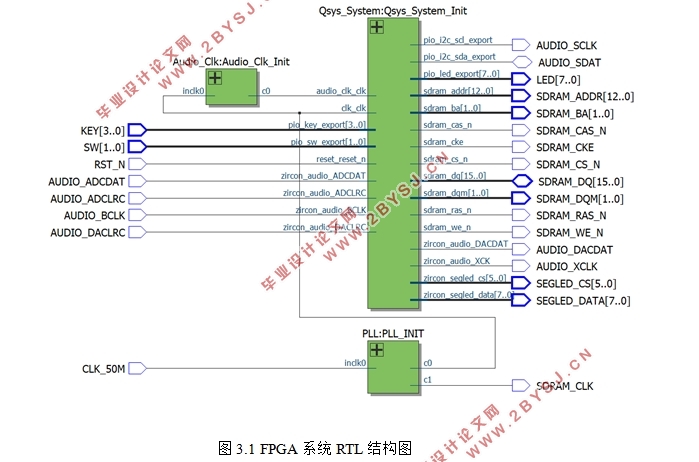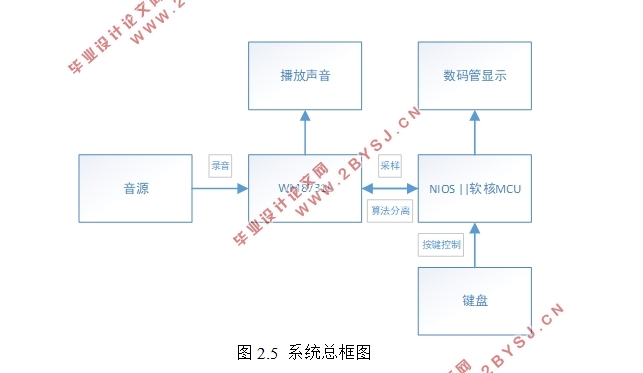FPGA的多路信号分离装置设计
无需注册登录,支付后按照提示操作即可获取该资料.
FPGA的多路信号分离装置设计(论文12000字)
摘要:在日常生活与工程实践之中,想要获得纯净的、理想的期望信号往往是十分困难的。这是因为,在实际的应用场合中除了目标信号外,一般还夹杂着环境中其他多种信号的干扰以及各样噪声的污染。然而,混杂多种信号的复合信号是不能直接用于后端系统的。比如,直接使用混杂噪声和干扰的定位信号来确定目标位置一定会影响定位的精度乃至产生错误定位。基于此,本设计提供了一种基于FPGA的多路信号分离的实现装置,实际解决信号混合问题,同时也是为信号处理系统提供一种前端信号分离的解决方案。
首先,通过音频模块WM8731L采集三路语音信号,将三路信号混合在一起通过音频模块与FPGA I2C通信协议装载到FPGA NIOS Ⅱ软核中并将该混合信号作为本设计中待处理的复合信号。
其次,本文对常用的分离混合信号的独立成分分析法(Independent Component Analysis,ICA)和主元分析方法(Principal Components Analysis,PCA)进行了介绍。重点分析两种算法的数学模型,并选择PCA作为本设计处理复合信号的核心算法,并在软核中实现PCA算法的编制。
最后,使用软核中的分离算法将其中的复合信号进行分离解析,将分离出来的三路信号存储下来并使用FPGA上的按键模块分别进行播放,使用挂耳式耳机监听其每一路信号的分离效果。同时,为了证明本装置的有效性,在论文中还使用MTALAB软件对混合信号、以及三路分离信号进行分析。对比于采集的三路信号,仿真结果充分说明本设计已经达到了设计预期,算法已成功地在FPGA软核中得到了实现。
关键词:信号分离,FPGA,主元分析,系统设计
Title:Multichannel signal separation device of FPGA
Abstrat:In daily life and engineering practice, it is often very difficult to get pure and ideal expectation signals. This is because, in practical applications, in addition to the target signal, it is generally mixed with other kinds of interference in the environment and all kinds of noise pollution. However, the composite signal with multiple signals can not be directly used in the back-end system. For example, locating target location directly using mixed noise and interference location will definitely affect the positioning accuracy and even lead to erroneous localization. Based on this, this design provides a multi-channel signal separation implementation device based on FPGA, which actually solves the problem of signal mixing and also provides a solution for the signal processing system to separate the front-end signal.
First, three audio signals are collected through the audio module WM8731L, and the three signals are mixed together to be loaded into the FPGA NIOS II soft core through the audio module and the FPGA I2C communication protocol, and the mixed signal is used as the complex signal to be processed in this design.
Secondly, this paper introduces the independent component analysis and principal component analysis for the commonly used mixed signals. The mathematical models of the two algorithms are analyzed emphatically, and PCA is chosen as the core algorithm for the design of composite signals, and the PCA algorithm is compiled in the soft core.
Finally, the separation algorithm in the soft core is used to separate and parse the composite signals. The separated three signal signals are stored and the key module on the FPGA is used respectively. The separation effect of each signal is monitored by using the ear type headset. At the same time, in order to prove the effectiveness of the device, MTALAB software is used to analyze mixed signals and three channel separation signals. Compared with the collected three signals, the simulation results fully show that the design has reached the design expectation, and the algorithm has been successfully implemented in the FPGA soft core.
Keywords:Signal separation, FPGA, principal component analysis, system design


目录
一、绪论 1
1.1研究背景及现状 1
1.1.1项目背景 1
1.1.2国内外研究现状 1
1.2项目研究目标 2
1.3本文主要研究工作 2
1.4论文的章节 3
二、设计方案 4
2.1设计目标 4
2.2设计方案选择 4
2.3系统设计方案 5
三、硬件实现方案 6
3.1 FPGA的RTL结构图 6
3.2主控制器部分 6
3.3采样播放部分 7
3.3.1WM8731L模块 7
3.3.2 I2C通信部分 10
3.3.3按键模块 11
3.3.4数码管模块 11
四、软件设计方案 13
4.1 盲信号算法框图 13
4.2两个算法简介 13
4.2.1ICA算法简介 13
4.2.2PCA算法简介 17
4.3FPGA部分算法图片 18
五、实验测试与结果分析 20
5.1数据采集方案的实现 20
5.2混合信号的分离的实现 21
5.3实物图 23
5.4误差分析 23
5.5小结 24
六、论文总结 25
6.1总结 25
6.2思考与展望 25
参考文献 26
致谢 27
